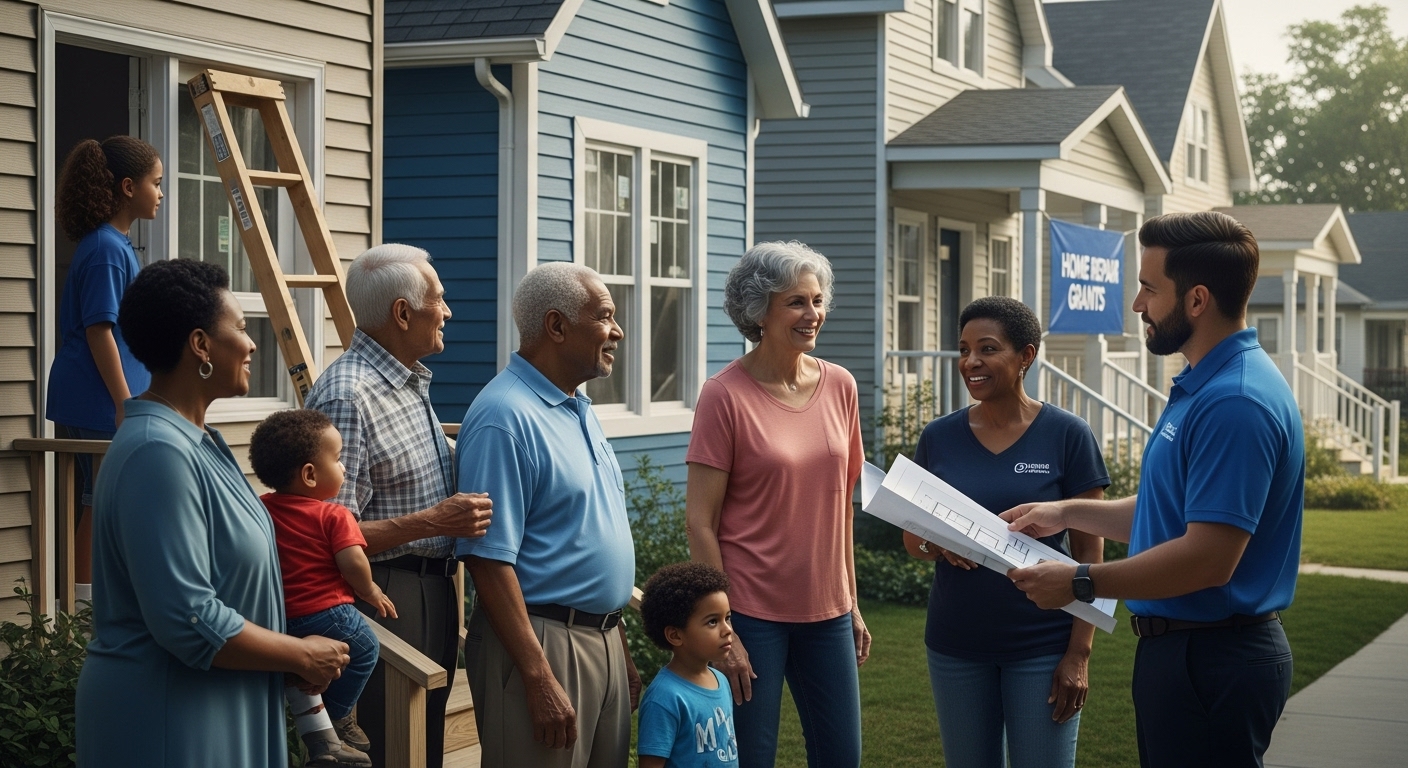Understanding Home Repair Grants Michigan: A Complete Guide

Home repair grants in Michigan are changing lives for families who struggle to fix leaking roofs or broken furnaces. You might assume that these programs barely make a dent, or only help a handful of people. Yet one recent partnership secured nearly $195,000 to help homeowners in Midland and Saginaw counties alone. The reality is these grants do much more than patch up homes—they can rescue entire communities from decline.
Table of Contents
- What Are Home Repair Grants In Michigan?
- Why Home Repair Grants Matter For Local Communities
- How Home Repair Grants Work: Funding And Eligibility
- Key Concepts In Home Repair Grants: Types And Uses
- Real-World Impact Of Home Repair Grants In Oakland County
Quick Summary
| Takeaway | Explanation |
|---|---|
| Home repair grants target low-income and vulnerable groups | Grants prioritize assistance for low to moderate-income families, seniors, veterans, and individuals with disabilities, addressing essential home repair needs. |
| Diverse grant types address specific homeowner issues | Grants cover emergency repairs, energy efficiency, accessibility, and senior modifications to ensure critical home maintenance is met. |
| Grants improve community health and stability | By preventing home deterioration, these programs enhance property values and contribute to healthier living conditions in neighborhoods. |
| Applications require specific eligibility criteria | Homeowners must meet income thresholds, own their home, and demonstrate the need for critical repairs to qualify for funding. |
| Funding comes from multiple sources | Grants are supported by state, federal, local governments, and non-profit organizations to ensure a comprehensive safety net for homeowners. |
What Are Home Repair Grants in Michigan?
Home repair grants in Michigan represent critical financial assistance programs designed to help homeowners address essential home maintenance and improvement needs. These grants provide funding to repair, rehabilitate, and upgrade residential properties, particularly for low to moderate income families, seniors, veterans, and individuals with disabilities.
Below is a table summarizing the main types of home repair grants available in Michigan, along with their targeted beneficiaries and primary use cases.
| Grant Type | Target Beneficiaries | Primary Purpose |
|---|---|---|
| Emergency Repair Grants | Low-income families, all households | Immediate repairs for safety or habitability |
| Energy Efficiency Grants | Homeowners seeking lower utility costs | Upgrades to reduce energy consumption |
| Accessibility Modification Grants | Individuals with disabilities | Home adaptations for accessibility |
| Senior Home Repair Assistance | Senior homeowners | Modifications and repairs enabling aging in place |
| Veterans Home Modification Grants | Veterans | Repairs or modifications to accommodate veterans |
| Weatherization Assistance Grants | Income-qualified homeowners | Insulation and energy conservation improvements |
| Structural Integrity Grants | All eligible homeowners | Foundation and major infrastructure repairs |
Understanding Grant Types and Eligibility
Home repair grants in Michigan come from multiple sources, including state government agencies, local municipalities, and federal programs. Key grant categories typically include:
- Emergency home repair grants for critical structural or safety issues
- Energy efficiency improvement grants
- Accessibility modification grants for disabled homeowners
- Senior home repair assistance programs
- Veterans home modification grants
Eligibility for these grants usually depends on several factors:
- Household income level (typically at or below 80% of area median income)
- Property location within Michigan
- Home ownership status
- Specific repair or improvement needs
- Personal demographic characteristics (age, veteran status, disability)
Program Objectives and Community Impact
According to the Michigan State Housing Development Authority, home repair grants serve multiple critical objectives. These programs aim to preserve affordable housing, prevent home deterioration, improve energy efficiency, and support vulnerable populations in maintaining safe and functional living environments.
The State Emergency Relief (SER) program, for instance, provides crucial support by offering grants for essential repairs like furnace replacements, hot water heater installations, and septic system corrections. These interventions not only improve individual home conditions but also contribute to broader community stability and residents quality of life.
By providing financial resources for home repairs, Michigan helps homeowners avoid potential foreclosure, maintain property values, and ensure safe living conditions for families across diverse economic backgrounds.
Why Home Repair Grants Matter for Local Communities
Home repair grants represent more than just financial assistance. They are strategic investments that transform neighborhoods, support vulnerable populations, and create sustainable community development across Michigan.
Economic Stabilization and Property Value Protection
These grants play a crucial role in maintaining and enhancing local economic ecosystems. When homeowners receive financial support for critical repairs, they prevent property deterioration, which has significant broader implications:
- Prevent home foreclosures and abandoned properties
- Maintain neighborhood property values
- Reduce urban blight and community decline
- Support local construction and home improvement industries
- Create economic resilience in vulnerable communities
By addressing home maintenance challenges, these grants help homeowners avoid potential financial catastrophes that could lead to property loss or significant personal economic setbacks.
Community Health and Social Equity
According to the Dow Credit Union and Habitat for Humanity Partnership, home repair grants represent critical interventions that support community well-being. These programs ensure that low-income families, seniors, veterans, and individuals with disabilities can maintain safe, functional living environments.
Key social benefits include:
- Improved housing safety standards
- Enhanced quality of life for vulnerable populations
- Reduced healthcare risks associated with substandard housing
- Preservation of generational family homes
- Support for aging in place
Long-Term Community Resilience
Home repair grants are strategic investments in community infrastructure. By providing targeted financial support, these programs help create more stable, sustainable neighborhoods. They encourage homeownership, prevent community decline, and foster a sense of pride and continuity in local residential areas.
Ultimately, home repair grants do more than fix houses. They rebuild hope, restore dignity, and reinvest in the fundamental social fabric that makes Michigan communities strong and vibrant.
How Home Repair Grants Work: Funding and Eligibility
Home repair grants in Michigan operate through a complex network of state, federal, and local programs designed to provide targeted financial assistance for residential property improvements. Understanding the intricate mechanics of these grants requires examining their funding sources, application processes, and specific eligibility requirements.
Funding Sources and Grant Mechanisms
Home repair grants in Michigan are funded through multiple channels, creating a comprehensive support system for homeowners. Primary funding sources include:
- State government appropriations
- Federal housing assistance programs
- Local municipal budget allocations
- Nonprofit organization partnerships
- Community development block grants
These diverse funding streams allow for flexible and responsive grant programs that can address various home repair needs across different demographic groups and geographic regions.
Eligibility Criteria and Application Process
According to the Michigan Department of Health and Human Services, eligibility for home repair grants typically involves several key considerations:
- Income Thresholds: Most programs target households at or below 80% of the area median income
- Property Ownership: Applicants must own and occupy the home as their primary residence
- Repair Necessity: Grants focus on critical repairs addressing safety, habitability, or essential infrastructure
- Geographic Restrictions: Some programs have specific county or municipal limitations
- Demographic Priorities: Certain grants provide additional support for seniors, veterans, or individuals with disabilities
Grant Utilization and Repair Priorities
Home repair grants in Michigan are strategically designed to address critical home maintenance needs. Typical eligible repairs include:
- Structural integrity improvements
- Essential system replacements (heating, plumbing, electrical)
- Accessibility modifications
- Energy efficiency upgrades
- Safety and health hazard mitigation
The application process generally involves comprehensive documentation, home inspections, and detailed repair proposals. Homeowners must demonstrate both financial need and the critical nature of proposed repairs, ensuring that limited grant resources are allocated to the most urgent and impactful home improvement projects.
The table below outlines key eligibility criteria and application process steps for Michigan home repair grants, helping homeowners understand what is required for successful applications.
| Eligibility/Requirement | Description |
|---|---|
| Income Thresholds | Most programs require income at or below 80% of area median |
| Property Ownership | Must own and occupy the home as a primary residence |
| Repair Necessity | Focus on critical repairs for safety or essential infrastructure |
| Geographic Restrictions | Some grants limited by county or municipality |
| Demographic Priorities | Additional support for seniors, veterans, or individuals with disabilities |
| Documentation | Income proof, ownership documents, repair need details |
| Home Inspection | Often required for final eligibility and repair verification |
Key Concepts in Home Repair Grants: Types and Uses
Home repair grants represent nuanced financial assistance programs designed to address specific residential maintenance challenges. Understanding their diverse applications requires a comprehensive exploration of their underlying principles, target demographics, and strategic objectives.
Grant Classification and Targeted Support
Home repair grants in Michigan are carefully structured to address distinct residential needs, encompassing multiple specialized categories:
- Emergency Repair Grants: Immediate assistance for critical safety and habitability issues
- Energy Efficiency Grants: Funding for upgrades reducing utility consumption
- Accessibility Modification Grants: Supporting home adaptations for individuals with disabilities
- Weatherization Assistance Grants: Comprehensive home insulation and energy conservation support
- Structural Integrity Grants: Addressing fundamental home infrastructure challenges
Each grant category targets specific homeowner requirements, ensuring focused and strategic financial support.

Scope and Repair Eligibility
According to the Weatherization Assistance Program, grant usage encompasses a wide range of residential improvements. Eligible repairs typically include:
- Structural reinforcement and foundation stabilization
- Electrical system upgrades and safety improvements
- Plumbing infrastructure enhancements
- HVAC system replacements and efficiency modifications
- Roof repairs and replacement
- Window and door insulation upgrades
- Critical safety system installations
Financial and Programmatic Limitations
Home repair grants are not unlimited resources. They come with specific financial parameters and programmatic restrictions designed to maximize community impact:
- Funding Caps: Most programs limit total grant amounts
- Income-Based Qualifications: Strict household income thresholds
- Priority Ranking: Critical repairs receive precedence
- Documentation Requirements: Comprehensive application processes
- Geographical Restrictions: Location-specific eligibility criteria
These strategic limitations ensure that grant resources are allocated efficiently, supporting those with the most urgent home maintenance needs while maintaining fiscal responsibility.
Real-World Impact of Home Repair Grants in Oakland County
Home repair grants have transformed residential landscapes across Oakland County, providing critical support to homeowners and revitalizing communities through strategic financial interventions. These programs represent more than monetary assistance; they are fundamental mechanisms for maintaining neighborhood stability and individual housing security.
Neighborhood Revitalization and Community Resilience
Oakland County has witnessed remarkable transformations through targeted home repair grant initiatives. Municipalities like Royal Oak, Pontiac, and Farmington Hills have experienced significant community improvements through these strategic investments:
- Reduction in abandoned or deteriorating properties
- Enhanced neighborhood aesthetic appeal
- Increased property values
- Improved residential infrastructure
- Strengthened community pride and engagement
These grants create a ripple effect, where individual home improvements contribute to broader community development and economic sustainability.
Targeted Support for Vulnerable Populations
According to the Michigan Department of Environment, Great Lakes, and Energy, home repair grants have been instrumental in addressing specific community needs. For instance, a $410,000 Brownfield Redevelopment Grant in Royal Oak Township facilitated the creation of 24 new affordable single-family homes, demonstrating how these programs can transform previously unusable spaces into vibrant residential areas.
Grants have particularly benefited:
- Low-income families
- Senior homeowners
- Veterans
- Individuals with disabilities
- First-time homeowners
Economic and Social Sustainability
Beyond immediate repairs, these grants contribute to long-term community economic health. By preventing home deterioration, supporting property maintenance, and enabling residents to remain in their communities, home repair grants create sustainable neighborhood ecosystems.
Learn more about Michigan housing opportunities that can complement these vital home repair grant programs. Each grant represents an investment not just in a physical structure, but in the future of Oakland County’s residential communities.

Ready to Secure Your Home and Your Future in Oakland County?
If you are feeling the weight of urgent repairs or the fear that home maintenance could threaten your stability, you are not alone. This guide on home repair grants in Michigan highlights the very real challenges homeowners face, especially when navigating emergency repairs, program eligibility, and the desire to preserve both comfort and value in your home. Through this process, the right local expertise can help you not only access critical grants but also protect your property’s long-term value.

Do not let essential repairs or overwhelming homeownership decisions hold you back. Connect with Tom Gilliam – RE/MAX Classic, a trusted local Realtor® who has helped countless families in Farmington Hills and across Oakland County achieve security and success. Whether you want to discover more about Michigan housing opportunities or need guidance tailored to your situation, Tom provides professional support every step of the way. Get in touch today and take the first step to secure both your home and your financial future.
Frequently Asked Questions
What are home repair grants in Michigan?
Home repair grants in Michigan are financial assistance programs to help homeowners repair, rehabilitate, and upgrade their properties, especially for low to moderate-income families, seniors, veterans, and individuals with disabilities.
Who is eligible for home repair grants in Michigan?
Eligibility for home repair grants typically depends on household income (usually at or below 80% of the area median income), property ownership status, specific repair needs, and personal demographic characteristics such as age or disability.
What types of repairs can be covered by home repair grants?
Home repair grants can cover a range of repairs including structural integrity improvements, heating and plumbing system replacements, accessibility modifications, energy efficiency upgrades, and safety hazard mitigation.
How do I apply for a home repair grant in Michigan?
To apply for a home repair grant, homeowners typically need to provide documentation of income, proof of home ownership, and details about the necessary repairs. The process may also involve home inspections and proposals outlining the planned improvements.
Recommended




